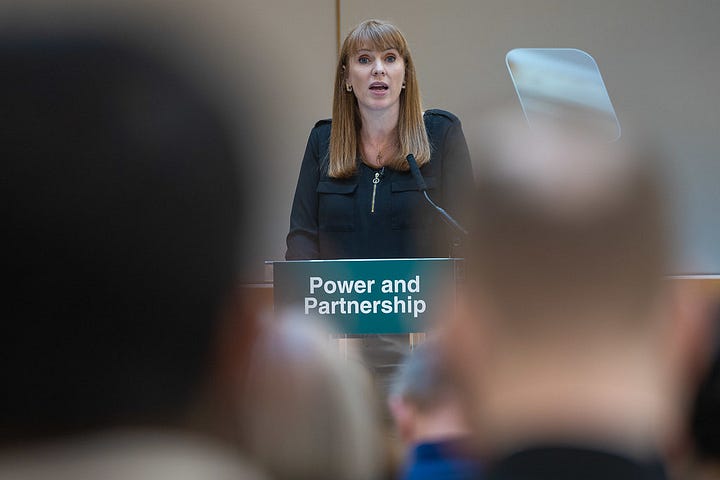Devolution is the future...
but will it end in tiers?
After weeks of speculation, the government has finally confirmed that it is set to embark on a far-reaching overhaul of local councils. It could lead to the break-up of the two-tier system that Kent has had for the best part of a century. Or it may not.
If you were expecting a clear cut package of reform of all councils, forget it. The White Paper on devolution is a perplexing mish-mash of possible plans that raises as many questions as it answers.
There is no specific mention of Kent County Council nor the districts; neither is there any mention of Medway.
Deputy Prime Minister Angela Rayner was leading the announcement of the government’s mission on reorganisation which on occasion, made the late John Prescott sound like a model of clarity.


Here’s an extract from the government’s briefing notes that confuses as much as it explains:
“The government will create in law the concept of a Strategic Authority. All Strategic Authorities will belong to one of the following levels.
Foundation Strategic Authorities: these include non-mayoral Combined Authorities and Combined County Authorities automatically, and any Local Authority designated as a Strategic Authority without a Mayor.
Mayoral Strategic Authorities: the Greater London Authority, all Mayoral Combined Authorities and all Mayoral Combined County Authorities will automatically begin as Mayoral Strategic Authorities. Those who meet specified eligibility criteria may be designated as Established Mayoral Strategic Authorities. This unlocks further devolution, most notably an Integrated Settlement.
A new frontier in local government? Possibly: Labour seems to be coming from the same position of wanting some kind of unitary structure in Kent in preference to the current set up.
The leaders of both Kent County Council and Medway Council have expressed cautious interest in the idea that they could be devolved powers - even if it comes at a cost to the existing two-tier set up and might be conditional on agreement to having some kind of regional elected mayor.
The thinking appears to be that the government has decided what it wants and councils will have to lump it, so better that they come to the devolution party now rather than later.
However, the pick-and-mix approach could lead to a fragmented system and risks a messy consensus and a turf war between councils.
While it has not been officially confirmed, Kent is reportedly among the first wave of councils to be asked to set out ideas.
In two-tier systems like Kent, the shake-up will probably be centred around the merger of district and borough councils and whether the county council can make the case for a single do-it-all authority. There are any number of possible unitary options and consensus is unlikely to be reached easily, which may in itself put the brakes on the idea.
Previous plans have gone of the rails. When four district councils in east Kent - Ashford, Thanet, Dover and Shepway - put forward the idea of becoming a single merged authority in 2017, it was torpedoed at the 11th hour by Conservative councillors in Shepway.
The merger had been proposed because the councils were increasingly concerned that the costs of providing services like rubbish collection were becoming unsustainable.
The fragility of the agreement illustrated the difficulties of persuading councils - and their representatives - to vote like turkeys for Christmas
Councils are unlikely to be persuaded of the case for reorganisation and the capacity of them to improve services unless there is more money involved.
Having said that, the government has hinted it will consider plans put forward by councils and there is no suggestion currently that ministers would reserve their rights to put in place something different to what councils want.
So what is motivating the government?
Re-organisation of local councils was hardly mentioned in the election campaign and voters were certainly not clamouring for change.
Indeed, the proposal might well be seen by voters as slightly less of a priority than other issues, such as the state of the NHS.
Then there is the argument around the costs and the savings. A study commissioned by the county councils network suggested that some £2.94bn could be ‘saved’ through abolition, then merger and creation of a single unitary.
But there was a significant difference in the savings that would be made if two unitaries rather than one replaced the county council.
The study was not necessarily helpful to those seeking a change, concluding that authorities in each area would reduce the financial benefit by two-thirds to £1bn over five years, with three unitary authorities delivering a net loss of £340m over the same period.
At a time when councils are wrestling with huge deficits and running the risk of bankruptcy, it might seem perverse to embark on a crusade to overhaul them just at the time when they are confronting the most serious cash crisis in history.
Then there is the issue of Kent not just having a two-tier system but a hybrid make-up - with Medway Council already operating independently as a unitary authority.
One possible option is that Medway might actually increase its size by absorbing other areas, such as Swale. It could equally make a move on Maidstone
And there could be close scrutiny of Dartford and Gravesham, which was put forward as a possible merger option in a government review in 1998 but rejected.
Either way, it looks as though the government is serious about the need for an overhaul.
And there is a clear potential flashpoint with the government’s determination to install some kind of regional mayors to oversee key policy areas like transport.
If there is to be a major shake-up, residents will need to be persuaded it is worth it.
But there are already some questioning whether a shotgun marriage is the best way to persuade us that a new path together is the future.

